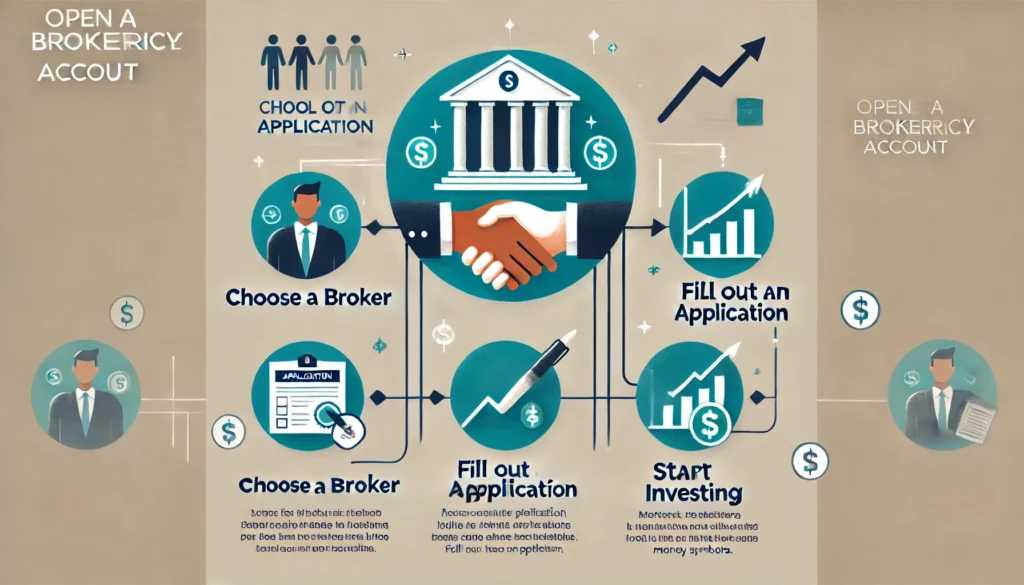Investing in the stock market is one of the most effective ways to build wealth over time. Whether you’re looking to save for retirement, a big purchase, or simply grow your money, opening a brokerage account is the first step. But what exactly is a brokerage account, and how do you open one? This guide will walk you through everything you need to know, from choosing the right broker to making your first trade.
What is a Brokerage Account?
A brokerage account is a type of investment account that allows you to buy and sell a wide range of financial securities, such as stocks, bonds, ETFs, and mutual funds. Unlike a savings account, which is primarily for storing money, a brokerage account is designed for investing. There are different types of brokerage accounts, including taxable accounts and retirement accounts like IRAs (Individual Retirement Accounts).
Choosing the Right Type: It’s important to choose the right type of brokerage account based on your investment goals. For example, if you’re saving for retirement, a tax-advantaged IRA might be a better choice than a standard taxable account.
Why You Need a Brokerage Account
A brokerage account provides you with access to the stock market, where you can purchase shares of companies, bonds, ETFs, and other investments. Here’s why you need one:
- Access to the Stock Market: A brokerage account is your gateway to investing in the stock market.
- Manage Your Investments: You can buy, sell, and manage your portfolio through your brokerage account.
- Financial Growth: Over time, your investments have the potential to grow, providing you with financial security and the ability to meet your financial goals.
Choosing the Right Broker
When it comes to choosing a broker, not all are created equal. Here’s what you should consider:
Factors to Consider
- Fees and Commissions: Some brokers charge per trade, while others offer commission-free trades. Be sure to understand the fee structure.
- Account Minimums: Some brokers require a minimum deposit to open an account.
- Investment Options: Look for a broker that offers the types of investments you’re interested in.
- Customer Service: Reliable customer support is essential, especially if you’re new to investing.
Types of Brokers
- Full-Service Brokers: These brokers provide a wide range of services, including investment advice, but they often charge higher fees.
- Discount Brokers: They offer fewer services but lower fees, making them ideal for DIY investors.
- Online Brokers: These brokers operate entirely online, offering easy access to your account and investments through their platform.
Quotes from Financial Experts
“The biggest risk is not taking any risk… In a world that’s changing really quickly, the only strategy that is guaranteed to fail is not taking risks.” – Mark Zuckerberg
“Investing should be more like watching paint dry or watching grass grow. If you want excitement, take $800 and go to Las Vegas.” – Paul Samuelson

Required Documents for Opening a Brokerage Account
Before you can open a brokerage account, you’ll need to gather some essential documents.
Basic Identification
- Government-Issued ID: A driver’s license or passport will usually suffice.
- Social Security Number (SSN): Required for tax reporting purposes.
Financial Information
- Employment Details: Some brokers may ask for your employment information.
- Bank Account Information: You’ll need this to fund your brokerage account.
- Tax Identification Number (TIN): If applicable, this is also required.
The Application Process
Opening a brokerage account is a straightforward process that can be completed online or in person.
Online Application
Most brokers offer an online application process that can be completed in minutes. You’ll need to:
- Fill Out Personal Information: Provide your name, address, SSN, and other details.
- Submit Financial Information: Include your employment details and financial status.
- Link Your Bank Account: This allows you to fund your brokerage account.
In-Person Application
If you prefer a more hands-on approach, you can visit a broker’s office to open an account. The process is similar to the online application but involves interacting with a representative who can guide you through each step.
Funding Your Brokerage Account
Once your account is set up, the next step is to fund it.
Initial Deposit
You can fund your account through various methods, including:
- ACH Transfer: Transfer funds directly from your bank account.
- Wire Transfer: For faster transfers, especially for larger amounts.
- Check: Some brokers accept checks, though this is less common.
Minimum Deposit Requirements
Brokers may have different minimum deposit requirements. Some allow you to open an account with as little as $0, while others might require a higher initial deposit.
Setting Up Automatic Transfers
To make investing easier, consider setting up automatic transfers from your bank account to your brokerage account. This helps you consistently invest over time without having to manually transfer funds.
Understanding Investment Options
Once your account is funded, it’s time to start investing. But what should you invest in?
Stocks
Stocks represent ownership in a company. When you buy a stock, you’re buying a share of that company’s earnings and assets. Stocks can offer high returns but come with higher risk.
ETFs (Exchange-Traded Funds)
ETFs are funds that track an index, sector, or commodity. They offer diversification because they hold a variety of assets, making them less risky than individual stocks.
Mutual Funds
Mutual funds pool money from multiple investors to buy a diversified portfolio of stocks, bonds, or other securities. They’re managed by professionals, making them a good option for beginners.
Bonds
Bonds are loans to companies or governments that pay interest over time. They’re generally safer than stocks but offer lower returns.
Options and Futures
These are more advanced investment options that involve contracts based on the price of an underlying asset. They’re best suited for experienced investors due to their complexity and risk.
Placing Your First Trade
Now that you understand your investment options, it’s time to place your first trade.
Market Order vs. Limit Order
- Market Order: Buys or sells immediately at the current market price.
- Limit Order: Buys or sells at a specific price you set.
How to Place a Trade
- Select the Investment: Choose the stock, ETF, or other investment you want to buy.
- Enter the Number of Shares: Decide how many shares you want to purchase.
- Choose the Order Type: Select between a market or limit order.
- Review and Confirm: Double-check your order details before confirming the trade.

Managing Your Investments
After placing your first trade, managing your investments becomes crucial.
Monitoring Your Portfolio
Regularly check the performance of your investments. Most brokers offer tools and reports to help you track your portfolio’s progress.
Rebalancing Your Portfolio
Over time, your portfolio may become unbalanced due to market fluctuations. Rebalancing involves buying or selling assets to maintain your desired asset allocation.
Setting Up Alerts and Notifications
Use your broker’s alert system to stay informed about significant changes in your investments. This can help you make timely decisions.
Key Takeaways
- Opening a brokerage account is the first step toward investing in the stock market.
- Choose a broker that fits your needs, considering factors like fees, minimums, and investment options.
- Understand the different types of investments available, and start with what aligns with your financial goals.
- Regularly manage and monitor your portfolio to ensure it stays on track.
Frequently Asked Questions (FAQ)
Q1: What is the minimum age to open a brokerage account?
Most brokers require you to be at least 18 years old to open a brokerage account. Minors can open a custodial account with the help of a parent or guardian.
Q2: Can I open a brokerage account with no money?
Yes, many brokers allow you to open an account with no initial deposit, though you’ll need to fund it before you can start investing.
Q3: How do I choose between different types of brokerage accounts?
Your choice depends on your investment goals. For general investing, a taxable account is sufficient. For retirement savings, consider an IRA or Roth IRA.
Q4: Is it safe to invest through an online broker?
Yes, online brokers are regulated and offer secure platforms for investing. However, it’s essential to choose a reputable broker with strong security measures.
Q5: What are the tax implications of a brokerage account?
Profits from investments in a brokerage account are subject to capital gains tax. The rate depends on how long you’ve held the investment and your income level.
Conclusion
Opening a brokerage account is your gateway to the world of investing. By choosing the right broker, understanding the application process, and knowing your investment options, you can start your journey toward financial growth. The sooner you start, the more time your money has to grow—so don’t wait!

